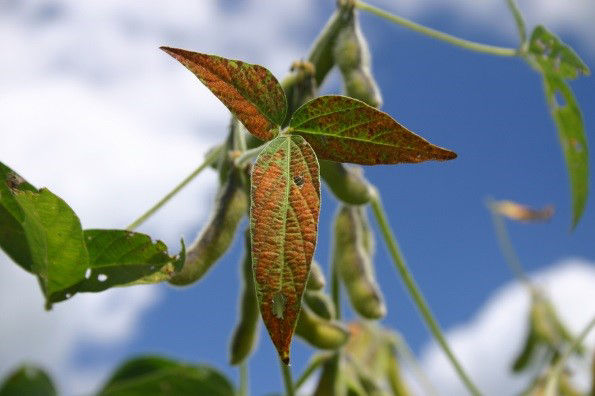Cercospora Leaf Blight
June 17, 2024
Cercospora blight, also known as Cercospora leaf blight, is a common foliar disease that can affect soybean plants. It is caused by the fungus Cercospora kikuchii and can cause yield loss if not properly managed.
Initially, Cercospora blight symptoms typically appear on the lower leaves as small, dark brown lesions with a yellow halo. As the disease progresses, these lesions can enlarge and coalesce, leading to the defoliation of the plant (Figure 1). In severe cases, the disease can also affect the stems, pods, and seeds. Infected seeds have irregular light to dark purple spots that may encompass the entire seed coat (Figure 2).

The impact of Cercospora blight on soybean yield can vary depending on the severity of the disease and the stage of plant development. Yield losses of up to 30% have been reported in fields with high disease pressure.1 The disease can also reduce seed quality, leading to lower germination rates, and increased levels of seed-borne pathogens.
To effectively manage Cercospora blight in soybean, it is important to implement an integrated disease management approach. This approach includes cultural practices, genetic resistance, and fungicide applications.
Cultural practices play a crucial role in reducing the severity and spread of Cercospora blight. These practices include crop rotation, tillage, and sanitation. Crop rotation can help break the disease cycle by reducing the amount of inoculum in the field. Tillage can bury infected plant debris, reducing the survival of the fungus. Sanitation involves removing and destroying infected plant material to prevent the spread of the disease.
Genetic resistance is an important tool in managing Cercospora blight. Planting soybean products with resistance to the disease can greatly reduce the severity and impact of the disease. It is important to select products that are specifically bred for resistance to Cercospora blight and other common soybean diseases.
Fungicide applications can be an effective tool in managing Cercospora blight, especially in fields with a history of the disease or in areas with high disease pressure. Fungicides should be applied preventatively, before symptoms of the disease appear. It is important to follow the recommended application rates and timings specified on the fungicide label. Regular scouting and monitoring of the field can help determine the need for fungicide applications.
In conclusion, Cercospora blight is a common foliar disease that can have a significant impact on soybean yield and quality. Implementing an integrated disease management approach that includes cultural practices, genetic resistance, and fungicide applications can help reduce the severity and spread of the disease. By following these strategies, soybean farmers can effectively manage Cercospora blight and protect their crop.
Channel Agronomist
Daniel Lundeen
Sources
1Giesler, L.J. and Miller, J.J. 2017. Managing foliar diseases in soybean. NebGuide. Nebraska Extension. University of Nebraska-Lincoln. https://extensionpubs.unl.edu/publication/g1862/html/view#:~:text=Lesions%20are%20reddish%20purple%20and%20necrotic%20blotches%20form.
Thomas-Murphy, J. Cercospora leaf blight and purple seed stain. Diseases of Soybeans. Field Crops. Cornell University. https://cals.cornell.edu/field-crops/soybeans/diseases-soybeans/cercospora-leaf-blight-and-purple-seed-stain
Geisler, L.J. Purple seed stain and cercospora blight. CROPWATCH. University of Nebraska. https://cropwatch.unl.edu/plantdisease/soybean/purple-seed-stain
Faske, F., Kirkpatrick, T., Zhou, J., and Tzanetakis, I. 2014. Soybean diseases. Arkansas Soybean Production Handbook. Chapter 11. University of Arkansas. https://www.uaex.uada.edu/publications/pdf/mp197/chapter11.pdf
Websites verified 04/05/2024. 1110_392051
You may also like...
Here are some articles that may also be of interest to you